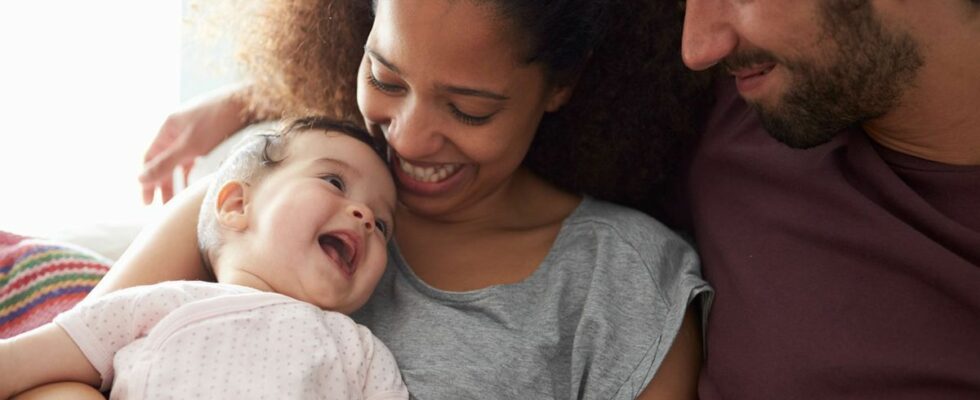Published on
Updated
Reading 3 min.
Mattëo, Elyo, Matilde or Loeiza: in addition to the diversity of first names given to newborns, there is a growing trend towards personalizing their spelling, which is shaking up the ranking of the most popular first names, dominated in 2023 by Louise and Gabriel.
Louise, Ambre, Alba and Jade for girls, Gabriel, Raphaël, Léo and Louis for boys: these are the most popular first names in 2023 according to INSEE (National Institute of Statistics and Economic Studies).
Emma, Rose, Alma, Alice, Romy and Anna complete this list published on the INSEE website in July. For the boys, Maël, Noah, Jules, Adam, Arthur and Isaac complete the Top Ten.
But the tendency to vary the spelling blurs the ranking. Thus Anna, with all its spelling variations (Hanna, Ana, Hana, Hannah, Hanaa, Anah….), would in fact be the most given feminine first name, followed by Mia, 13th according to INSEE, which rises to second place with its variations (Mÿa, Miyah, Miah…), calculated the data service of Le Figaro.
Before 1993, “the civil registrar could correct the spelling of first names, but since then he has had to write them in the spelling requested by the parents,” explains sociologist Baptiste Coulmont, professor at the Ecole Normale Supérieure Paris Saclay.
“Today, more than 12,000 first names are listed in the First Names File. In the 19th century, 50 first names were enough to name 75% of boys or girls. Today, the most commonly given name is given to only 1% of girls born in the year. In the 1970s, the Christophes represented 4% of male births.“, explains the author of “Sociology of First Names”.
The choice of singularity is explained by the fact that the first name is used today to identify someone in a group: a class, the workplace, where people were called by their last name until the 70s, adds the sociologist.
Added to this diversity is an increasing variety of spellings: Alya goes from 40th to 7th place if we add 22 different spellings (Aliyah, Alliah, etc.). Elio (Elyo, Helio, etc.) rises from 31st to 9th place, according to Le Figaro.
Elodie named her children Loeiza, 9, and Iwen, 5. “Our last name is common and my husband Frédéric has a namesake in the neighborhood. My first name was given to two or three girls per class. We were looking for original first names,” she explains.
“We liked Ewen, but were worried there would be too many, so we changed a letter to stand out even more.” explains this 41-year-old employee.
“Social Tattoo”
“The number of names in use is an indicator used to measure the level of individualism in a country. People want a unique and different name for their child, who they see as a unique individual“, explains Jean-François Amadieu, professor at the University of Paris 1 Panthéon Sorbonne.
Furthermore, migratory flows “generate a very large number of first names with varied spellings” due to the phonetic adaptation of foreign alphabets, he adds.
For his part, Baptiste Coulmont notes that “the idea that spelling is sacred is important to highly educated people. Some people attach less importance to it and write their first name as they see fit.”
Originality is not without risk. “Parents want to do well, but scientific studies have shown that first names with unconventional spellings can cause rejection in others, because the human brain does not like what is complicated,” says Anne-Laure Sellier, professor of behavioral sciences at HEC. “Matilde risks spending her life presenting herself as Matilde without an H.”
The first factor of mockery at early school – an important age for the development of the child – is the name or first name, underlines Mr. Amadieu, author of “The Keys to Destiny”.
“Parents think that the choice of the first name is their business. But it is the child who will bear it and the others who will use it. The first name is a social tattoo“, notes Ms. Sellier, author of “The Science of First Names”.

